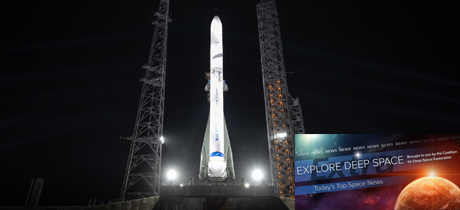Subscribe to our Daily Newsletter:
Don’t miss the latest developments in space policy, science, and exploration with Deep Space Extra, delivered directly to your inbox from Monday to Friday.
Here is a list of news that were published in our Newsletter the week of February 19, 2024:
Human Space Exploration:
-
Space Science
Other News
Major Space Related Activities for the Week
- Intuitive Machines’ Nova-C lunar lander, Odysseus, is enroute to attempt a landing at the Moon’s south pole on Thursday afternoon. If successful, it will be the first lunar landing by the U.S. since Apollo 17 the final Apollo era Moon landing in December 1972. Launched last Thursday, February 15, the Odysseus mission is part of NASA’s Commercial Lunar Payload Services (CLPS) initiative and will gather science data upon descent and landing from the Malapert-A crater at the lunar south pole which is of value to NASA’s Artemis III mission, which is to return human explorers to the surface of the Moon in September 2026.
- The 26th annual FAA Commercial Space Transportation Conference hosted in partnership with the Commercial Spaceflight Federation is meeting in Washington on Wednesday through Thursday. Also on Wednesday, NASA Administrator Bill Nelson will host a news briefing on scientific research activities underway aboard the International Space Station (ISS) with U.S. European and Japanese space station crew members. NASA will air and live stream the exchange over NASA TV and www.nasa.gov/nasalive beginning at 10:35 a.m. EST.
- Meanwhile, the U.S. House and Senate continue to face a government shutdown unless they can come to agreement on a 2024 budget or another in a succession of continuing budget resolutions (CRs). The expiration dates for the current staggered CRs are March 2 and 8. The federal fiscal 2024 began October 1 without a yearlong budget, restraining current spending to 2023 appropriations levels. If a formal budget for 2024 has not been enacted by April 30, the 2023 spending level under current CRs will be cut by another one percent. The current CR funds NASA until March 8.
Source link






